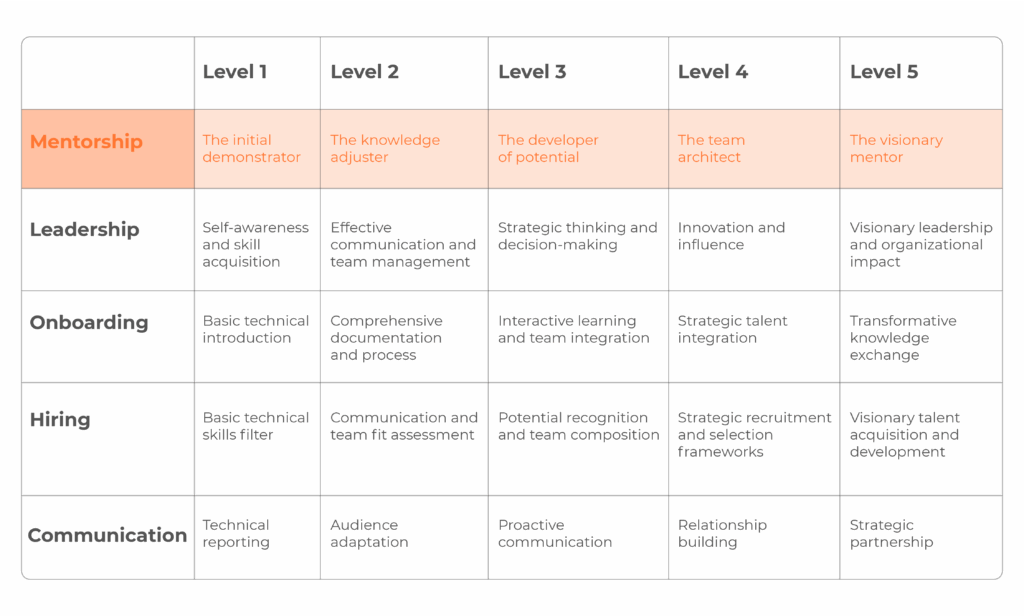Technical Leads play a pivotal role in shaping both company culture and client relationships. They serve as the cornerstone between developers, management, and clients, wielding significant influence on team effectiveness and project outcomes.
This article – the first in a five-part series – focuses on the critical mentorship skills that Technical Leads must develop throughout their career journey. By understanding the progression from basic demonstration to visionary mentorship, you can better support your TLs and ensure your teams thrive.
The technical lead's five core skills
A comprehensive Technical Lead skill set encompasses five essential areas, each with its own development path and mastery levels:
Mentorship – guiding team members’ growth and development
Leadership – directing teams toward objectives while fostering engagement
Onboarding – efficiently integrating new team members and clients
Hiring – identifying and acquiring talent
Communication – managing expectations and building relationships
Each skill area develops across five progressive levels, from junior to senior+. This article focuses specifically on the mentorship skill, while next parts will address the remaining four competencies.
The evolution of mentorship skills in technical leads
Mentorship represents one of the most fundamental yet challenging skills for Technical Leads. As they progress through their careers, their approach to mentoring evolves significantly, becoming more sophisticated and impactful. Let’s explore each level in detail.

Level 1. The initial demonstrator (junior)
In the initial phase, at the beginning of the developer TL journey, their mentorship approach is straightforward, more simple. They show how tasks are done by example, without considering the trainee’s existing skill level or their ability to learn themselves.
This stage is characterized by a hands-on approach, with the tech lead demonstrating tasks and expecting the trainee to observe and learn. The primary limitation at this stage is the lack of personalized development goals for the trainee, making the mentorship somewhat generic and possibly less effective for individuals with different learning needs.
Advice for advancement:
Before demonstrations, ask trainees about their prior experience with similar tasks
Create simple checklists of key points to cover during demonstrations
Follow up with specific questions to verify understanding
Request feedback on your demonstration clarity
Record demonstration sessions for trainees to reference later
Level 2. The knowledge adjuster (middle)
As the tech lead advances to the next stage, they become more aware of the trainee’s level and start to tailor their mentorship approach accordingly. They can identify knowledge gaps and discuss ways to bridge these gaps, making the onboarding process more effective.
However, at this stage, the tech lead does not actively track the trainee’s progress, leaving the responsibility for learning with the trainee. This stage marks the beginning of a more adaptive and responsive mentorship style, although it still lacks active engagement in the trainee’s development journey.
Advice for advancement:
Develop a simple skills matrix for your team to better identify knowledge gaps
Create personalized learning resource lists for different team members
Schedule regular check-ins focused specifically on learning progress
Introduce pair programming sessions targeting identified skill gaps
Document common knowledge gaps to develop reusable training materials
Level 3. The developer of potential (middle-high)
Reaching the midpoint of the mentorship evolution, the tech lead now evaluates not only knowledge gaps but also the potential of the trainee. They can suggest roles and competencies that fit the trainee’s profile, draft a development plan, and take responsibility for the trainee’s adherence to this plan.
This stage is significant for its focus on personalized development, marking a shift from merely imparting knowledge to actively shaping the trainee’s career trajectory.
Advice for advancement:
Develop formalized individual development plans with clear milestones
Implement regular progress reviews with measurable objectives
Align individual growth plans with upcoming project needs
Identify and advocate for specific training or conference opportunities
Create “stretch assignments” that challenge team members appropriately
Document successful development strategies to share with other TLs
Level 4. The team architect (senior)
At this advanced stage, the tech lead possesses a qualitative and quantitative understanding of their colleagues’ competencies. They know how to align individual development plans with the team’s needs, facilitating the growth of both individuals and the team as a whole.
This stage is characterized by a holistic approach to mentorship, where the tech lead not only teaches but also orchestrates the exchange of experiences within the team, enhancing the collective knowledge and skills.
Advice for advancement:
Create a comprehensive team skills matrix highlighting both strengths and gaps
Establish a formal internal knowledge-sharing program
Rotate responsibilities to cross-pollinate skills across the team
Develop metrics to measure both individual and team capability growth
Build relationships with other teams to facilitate cross-team learning opportunities
Advocate for resources that address collective team growth needs
Level 5. The visionary mentor (senior +)
In the final stage, the tech lead transcends traditional mentorship roles to become a visionary mentor. They build career tracks for each team member and the team collectively, treating the team as a dynamic entity capable of growth and evolution.
This stage involves identifying both individual and team development opportunities, organizing cross-specialization experience exchanges, and actively participating in external knowledge-sharing activities. The visionary mentor has a profound impact on the team’s long-term success and resilience, fostering an environment where continuous learning and adaptation are integral to the team’s culture.
Advice:
Develop a long-term (2-3 year) team evolution strategy
Create formal mentorship programs pairing senior and junior team members
Establish connections with academic institutions or industry groups
Implement structured knowledge-sharing beyond the immediate team
Advocate for organizational changes that support team evolution
Develop metrics to measure the broader impact of your team’s expertise
The challenge of younger technical leads
Today’s senior developers are much younger than they were before, after 4,5 years in the industry, it is considered a developer can be senior. Consequently, Technical Leadership is becoming a playground for the people who are too young.
How much are your clients ready for this? How much of leadership and mentorship processes can run smoothly if people with less experience are doing it?
The answer is quite simple. Even your younger TLs must learn from something or somebody how to do some things correctly and what to keep in mind in certain situations.
This article is a step in that direction. Let them know what is expected out of them on their mentorship journey. Younger people tend to change more easily and more fastly.
Believe in your younger TL generations but give them enough knowledge to be able to perform on levels that are expected. Mentorship skill is explained in 5 levels, read more about other TL skills in the next blog post.
FAQ
1. How does a technical lead balance technical responsibilities with mentorship duties?
Balancing technical responsibilities with mentorship duties is a common challenge for Technical Leads. Effective TLs use time management and delegation of the tasks to ensure that all team members receive adequate attention.
This involves setting automatic acceptance, code review is being done by the whole team, scheduling regular mentorship sessions, and utilizing team strengths to manage technical tasks efficiently. Additionally, TLs should cultivate a culture of mutual support within the team, encouraging team members to assist each other, which in turn reduces the mentorship load on the TL and fosters a collaborative team environment.
2. How can technical leads measure the success of their mentorship?
Measuring the success of mentorship is being done by the HR department. It involves both qualitative and quantitative metrics. Technical Leads can track their own progress through specific milestones in personal development plans, improvements in team performance, and feedback from mentees and project stakeholders.
Regular one-on-one meetings with HR and mentees to discuss challenges, achievements, and areas for improvement provide valuable insights into the mentorship’s effectiveness. Additionally, TLs, the same as HR, can use surveys or feedback tools to gather anonymous feedback from team members about the mentorship experience, allowing for continuous improvement.
3. What role does IT company culture play in shaping mentorship processes?
Organizational culture plays a crucial role in shaping mentorship practices. A culture that values continuous learning, knowledge sharing, and personal development naturally encourages effective mentorship. In such environments, mentorship is seen as a key component of professional growth, not just for mentees but for mentors themselves.
Organizations should strive to create an environment where asking questions, seeking help, and sharing experiences are encouraged and recognized. This involves leadership demonstrating these values in their actions and decisions, providing resources for mentorship activities, and celebrating successes that result from effective mentorship.
Chapters
- The technical lead's five core skills
- The evolution of mentorship skills in technical leads
- Level 1. The initial demonstrator
- Level 2. The knowledge adjuster
- Level 3. The developer of potential
- Level 4. The team architect
- Level 5. The visionary mentor
- The challenge of younger technical leads
- FAQ



